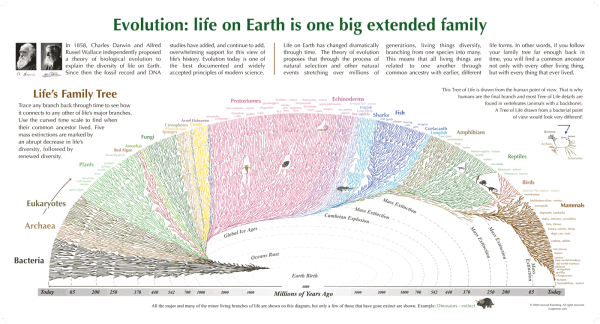“Never waste your time trying to explain who you are to people who are committed to misunderstanding you.” -Dream Hampton
As any scientist knows, it's true that no scientific theory, no matter how well-tested, how validated, or how universally applicable it is, can ever be 100% proven.
 Image credit: Leonard Eisenberg, 2008, via http://www.evogeneao.com/.
Image credit: Leonard Eisenberg, 2008, via http://www.evogeneao.com/.
But is this a flaw, or is it a feature of science? As it turns out, being able to revise, refine, and learn as we move forward leads to something even better than scientific "proof."
It leads to an increasingly accurate picture of all the natural phenomena in the entire Universe.


"It’s not 100% proof. It’s always open to refinement and improvement, and in that sense, it’s even better"
Thank You for saying that.
That seems to also hold for other human endeavors like Religion and Government.
Just look at how the food pyramid has been turned upside down.
Theories are statements about models. Measurement or observation can support or rebut the applicability of the theory to the material world; its validity. Proof is only possible within the theory itself. This is a clear and consistent conceptualization which removes law from discourse.
Hell, it's the bleeding SAVING GRACE of science (over religion).
Religion, you MUST believe you're right, or you don't believe and it's all for nothing. For science, you MUST consider whether (and how, where and what to do) you're wrong. Religious and scientific thought are, to this extent, antitheitical.
Moreover, claim a "law of science" wrong, and you're claiming a human, with all the options for error and frailty that entails, wrong. Religion, you're saying GOD is wrong, who is infallible and you owe EVERYTHING to.
And life, to science, is a TRUE GIFT, one with no giver, therefore no expectation of owing someone for it (hence no coercive force or guilt), whereas to religion, life was given to you specifically and you owe for it BIG TIME, with no call-back for a good life from the giver (see Calvinism for the explicit form of this).
Short version, religion wants to to consider you're right, science wants to consider "what if you're wrong?". A query that kills religion.
Note that this doesn't mean you can't believe in a god, but consider yourself wrong on it. If what you believe god wants you to do is still good, then go ahead, if not, STOP.
Excellent way to summarize what a scientific theory is. Actually, any theory about anything. The steps to make a theory about anything reasonably possible are here. If you don't question your theory, then it's not a theory but an act of faith. Acts of faith are totally out of the sphere of human knowledge and any discussion about them is completely futile.
I have always been intrigued ever since I was a child: where is the end of outer space? Also, if there is an end to outer space, then, is there other finite barriers outside of the inner barriers going on in infinitum? In other words, is there such a thing as "infinity? "
There's no end. No spot you can point to that is the end.